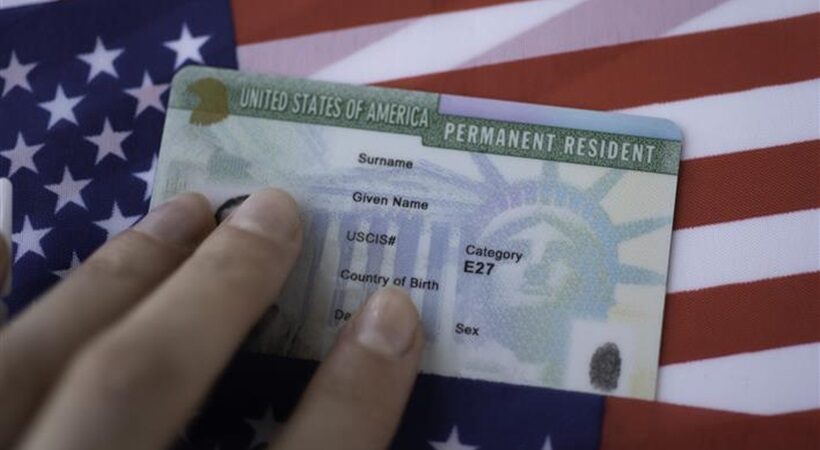Nearly one lakh employment-based Green Cards may go to waste in less than two months, a development that has caused resentment among professionals who have been waiting for legal permanent residency for decades. A Green Card, or a Permanent Resident Card, is evidence that the immigrant who owns it has been granted the privilege of residing permanently in the US.
Indian professional Sandeep Pawar told PTI that this year’s quota for employment-based immigrants is 2,61,500, which is much higher than the usual 1,40,000.
“Unfortunately, under the law, if these visas aren’t issued by September 30, they are lost forever,” Pawar was quoted as saying.
He further said that the current pace of processing by US Citizenship and Immigration Services or USCIS suggests they might go on to waste as many as one lakh green cards. If the Biden administration or the USCIS does not take the necessary steps now, 1,00,000 Green Cards available this year will simply be wasted.
“There are hundreds of thousands of gainfully employed legal immigrants in the US who would benefit from these Green Cards. Many of them have been waiting for a decade or more to adjust to permanent resident status but have been unable to do so due to a lack of available visa numbers,” he said.
“But this year, if the USCIS does its job efficiently and promptly, these immigrants finally have the opportunity to become permanent residents, something which would otherwise take decades,” added Pawar.
Meanwhile, 125 Indian and Chinese nationals have filed a lawsuit in the US to challenge the slowdown in adjudicating green card approvals. They aim to save the annual quota of green cards that lapse at the end of the fiscal year.
As per the petition, the Department of Homeland Security had failed to adjudicate applications for several green cards on time. This has led to “hundreds of thousands” of visas going to waste. As a result of this, numerous Indian and Chinese professionals will miss the opportunity to become permanent residents, the petition states. They even fall back into a “backlog” for years before they can finally immigrate.
“Most potential beneficiaries, such as myself, are from India, a country that is the most backlogged due to inherently racist and discriminatory per-country quotas embedded in the INA. Many have spouses, mostly women, who are unable to work until they become permanent residents,” Pawar said.
“Many have kids who will age out and be forced to self-deport even though this is the only country they know. The harm is both immense and irreparable if these Green Cards are not used,” he added.
The pandemic led to very few family-based green cards being approved in fiscal 2020. As a result, they were ‘rolled over’ to the employment-based category in FY21. USCIS follows an October to September year. As per the most recent data from USCIS, approximately 2,73,000 employment-based green card applications were pending as of March 31, 2021.
Nearly one lakh employment-based Green Cards may go to waste in less than two months, a development that has caused resentment among professionals who have been waiting for legal permanent residency for decades. A Green Card, or a Permanent Resident Card, is evidence that the immigrant who owns it has been granted the privilege of residing permanently in the US.
Indian professional Sandeep Pawar told PTI that this year’s quota for employment-based immigrants is 2,61,500, which is much higher than the usual 1,40,000.
“Unfortunately, under the law, if these visas aren’t issued by September 30, they are lost forever,” Pawar was quoted as saying.
He further said that the current pace of processing by US Citizenship and Immigration Services or USCIS suggests they might go on to waste as many as one lakh green cards. If the Biden administration or the USCIS does not take the necessary steps now, 1,00,000 Green Cards available this year will simply be wasted.
“There are hundreds of thousands of gainfully employed legal immigrants in the US who would benefit from these Green Cards. Many of them have been waiting for a decade or more to adjust to permanent resident status but have been unable to do so due to a lack of available visa numbers,” he said.
“But this year, if the USCIS does its job efficiently and promptly, these immigrants finally have the opportunity to become permanent residents, something which would otherwise take decades,” added Pawar.
Meanwhile, 125 Indian and Chinese nationals have filed a lawsuit in the US to challenge the slowdown in adjudicating green card approvals. They aim to save the annual quota of green cards that lapse at the end of the fiscal year.
As per the petition, the Department of Homeland Security had failed to adjudicate applications for several green cards on time. This has led to “hundreds of thousands” of visas going to waste. As a result of this, numerous Indian and Chinese professionals will miss the opportunity to become permanent residents, the petition states. They even fall back into a “backlog” for years before they can finally immigrate.
“Most potential beneficiaries, such as myself, are from India, a country that is the most backlogged due to inherently racist and discriminatory per-country quotas embedded in the INA. Many have spouses, mostly women, who are unable to work until they become permanent residents,” Pawar said.
“Many have kids who will age out and be forced to self-deport even though this is the only country they know. The harm is both immense and irreparable if these Green Cards are not used,” he added.
The pandemic led to very few family-based green cards being approved in fiscal 2020. As a result, they were ‘rolled over’ to the employment-based category in FY21. USCIS follows an October to September year. As per the most recent data from USCIS, approximately 2,73,000 employment-based green card applications were pending as of March 31, 2021.



















